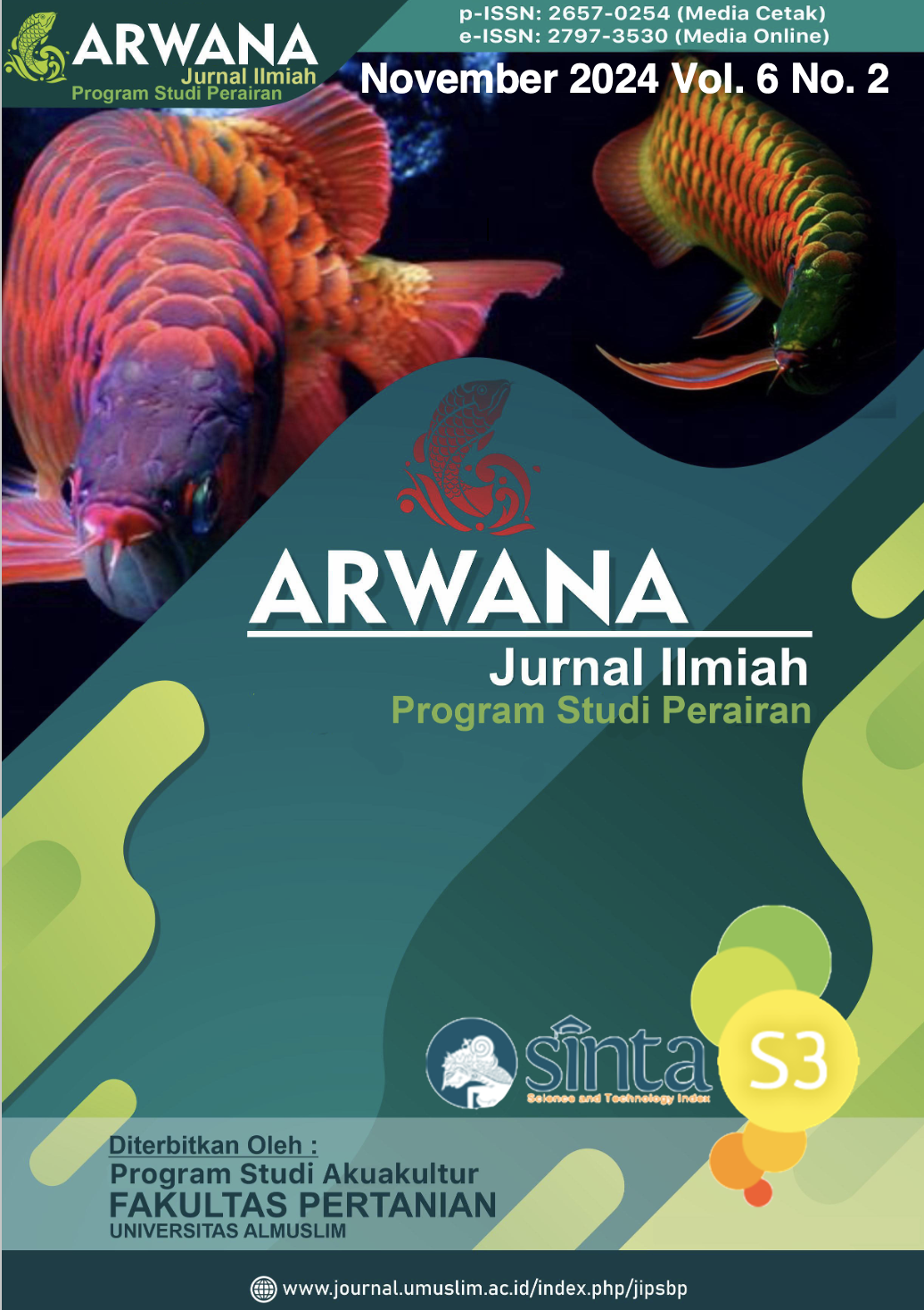Effectiveness of growing catfish (Clarias gariepenus) using feed with chicken manure substitution
DOI:
https://doi.org/10.51179/jipsbp.v6i2.2981Abstrak
Catfish is a fish that is currently in great demand among Indonesian people. Catfish are nocturnal fish that are active at night and are also omnivorous or eat everything. Catfish is a fish that can consume food from plants such as vegetables and trash fish as well as other food ingredients, one of which is chicken manure. The nutritional content of chicken manure can be substituted in making catfish feed so that the use of chicken manure for fish feed can be done. In this study, 4 treatments were made with 3 repetitions, namely A1 (control), A2 (10%), A3 (15%) and A4 (20%). The highest protein content was obtained in treatment A4 (20%) with a value of 32.40%. The best daily growth results were obtained in treatment A2 (10%) which was 3.80 cm and was the highest value compared to the daily growth value in the control. The best survival rate results were obtained in treatment A3 (15%), namely 99.33%. The best feed efficiency was obtained in treatment A2 (10%), namely 97.70% and the highest survival value was obtained in this treatment. From the results of the research that has been carried out, it was found that the best treatment is the use of chicken manure in treatment A2, namely the use of 10% manure in additional feed for catfish farming fish, so that the use of 10% chicken manure in 1 kg of feed can increase growth and feed efficiency in fish farming catfish.
Unduhan
Referensi
Adewumi,AA., Adewumi, IK and Olaleye, VF. (2011). Livestock wastes: fish-wealth solution. Water resources Management. Vol. 145 : 793-800. doi: 10.2495/WRM110711
Apriani dan Rihi. (2019). Pengaruh Pemberian Pakan Alami dan Buatan terhadap Pertumbuhan Kelangsungan Hidup Benih Ikan Lele Dumbo (Clarias gariepinus) di Balai Banih Sentral Noekele Kabupaten Kupang. Bioedu. Vol.4. (2): Hal 56-62. doi:10.32938/jbe.v4i2.387
Armando, E., W,S Maheno dan M. Rasyid. (2018). The Effect of Different Temperature Toward The Survival Rate and Specific Growth Rate of The Silver Arwana Fish (Osteoglossum bicirrhosum). Journal of Aquaculture Development and Environment. 1(1):31-34. doi:10.31002/jade.v1i1.1016
Chau Thi Da, Torbjorn Lundh, and Jan Erik Lindberg. (2012). Evaluation of local feed resources as alternative to fish meal in terms of growth performanc, feed utilization and biological indices of striped catfish (Pangasianodon hypophthalmus) fingerlings. Aquaculture. Vol. 364-365, pp. 150-156. doi:10.1016/j.aquaculture.2012.08.010
Elsaidy N, Abouelenien FA, Kirrella GAK. 2015. Impact of using raw or fermented manure as fish feed on microbial quality of water and fish. Egyptian J Aquatic Res 41:93- 100. doi:10.1016/j.ejar.2015.01.002
Florial Nagel. (2012). Albumin and globulin rapeseed protein fractions as fish meal alternative in diets fed to rainbow trout (Oncorhynchus mykiss W). Aquaculture. Vol. 354-355, pp. 121-127. doi:10.1016/j.aquaculture.2012.03.024
Isnawati, N., R. Sidik., dan G. Mahasri. (2015). Potensi Serbuk Daun Pepaya untuk Meningkatkan Efisiensi Pemanfaatan Pakan, Rasio Efisiensi Protein dan Laju Pertumbuhan pada Budidaya Ikan Nila (Oreochromis niloticus). Jurnal Ilmiah Perikanan dan Kelautan. 7(2): 121-124. doi:10.20473/jipk.v7i2.11212
Jamila, Tangdilintin FK, Astuti R. (2009). Kandungan protein kasar dan serat kasar pada feses ayam yang difermentasi dengan Lactobacillus Sp. Pp 557-560. Prosiding Seminar Nasional Teknologi Peternakan dan Veteriner. 13-14 Agustus 2009. Puslitbang Peternakan, Bogor
Katheline Hua. (2019). The future of aquatic protein : implications for protein sources in aquaculture diet. One Earth. pp. 16-329. doi:10.1016/j.oneear.2019.10.018
Maroua Sabbagh. (2019). Poultry by product meal as an alternative to fish meal in the juvenile gilthead seabream (Sparus aurata) diet. Aquaculture. Vol. 511, p. 734220. doi:10.1016/j.aquaculture.2019.734220
Puteri, R. E., Saadah R., Sari, S.R. (2021). Karakteristik Fisi Pakan Ikan Buatan dengan Subtitusi Manure Ayam. Jurnal Ilmu Perikanan.Vol 2 (1). Hal 1-7. doi:10.56869/clarias.v1i1
Puteri, R.E.., Saadah R., Laras., R.G. (2022). Evaluasi Nilai Gizi dan Kandungan Asam Amino Pada Kotoran Unggas untuk Pakan Ikan Lele (Clarias gariepinus). Jurnal Perikanna Unram. Vol 12 (4). Hal. 691-698. doi:10.29303/jp.v12i4.343
R L Lovell. (2014). Nutrition of aquaculture species. Journal of animal science. Vol. 69, pp. 4193-4200,
Rosmawati dan Muarif. (2010). Kelangsungan Hidup dan Pertumbuhan Benih Ikan Lele Dumbo (Clarias wasp) pada Sistem Resirkulasi dengn Kepadatan Berbeda. Sains Akuatik. Vol 13.(2): Hal 1-8.
Standar Nasional Indonesia. (2006). Pakan Buatan Untuk Ikan Lele (Clarias gariepinus). SNI 01-4087-2006. Dewan Standarisasi Nasional. Jakarta.
Taha Ismail. (2020). Using of betaine to replace fish meal with soybean or/and corn gluten meal in nile tilapia (Oreochromis niloticus) diets: Histomorphology, growth, fatty acid, and glucose-related gene expression traits. Aquaculture. Vol. 17, pp. 1-8. doi:10.1016/j.aqrep.2020.100376
Xindang Zhang. (2020). Assesment of rapeseed meal as fish meal alternative in diets for juvenile Asian red-tailed catfish (Hemibagrus wyckioides). Aquacultur reports. p. 100497. doi:10.1016/j.aqrep.2020.100497
Unduhan
Diterbitkan
Cara Mengutip
Terbitan
Bagian
Lisensi
Hak Cipta (c) 2024 Arwana: Jurnal Ilmiah Program Studi Perairan

Artikel ini berlisensiCreative Commons Attribution-ShareAlike 4.0 International License.
























